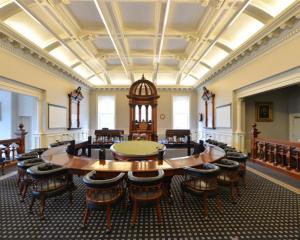Councillors at this week's full council meeting voted to approve the council's new social wellbeing strategy, which covered areas ranging from economic, community and city development to transportation.
The document replaced the council's community policy 1997, which was considered out of date, and provided a new framework within which the council could plan for some of the city's big challenges, a council staff report said.
The strategy identified ''very significant'' social issues facing the city, including an ageing population, with forecasts showing the number of people aged 65 years and over would increase 54% over the next 20 years, from 14% to 20% of the city's population.
That would, in turn, mean increasing demand for a range of needs, including more social housing and smaller private homes, as well as greater use of health-care and public transport services and a desire for better pedestrian environments, the strategy predicted.
Low income levels within Dunedin, which could lead to poorer health, increased crime and other problems associated with poverty, was another problem that needed to be planned for, the strategy said.
So, too, did the challenges associated with Dunedin's old housing stock, changes to the allocation of central Government funding and services within the city, and a trend towards less healthy lifestyles.
The new strategy did not include new or additional spending, but set the framework that would allow individual pieces of work to be prioritised to meet the strategy's overall goals, the council staff report said.
That included setting strategic directions, priorities and implementation pathways that included specific initiatives, such as planning a new ''whole-of-city'' approach to housing quality improvement.
The new strategy, more than a year in the making, had been shaped by community consultation and feedback from about 900 people, including through submissions, meetings and the Your City, Our Future and People's Panel initiatives, the council staff report said.
The new strategy was also part of a push to simplify the council's planning efforts, under which 48 council strategies and action plans had been reduced to nine key strategies, including for social wellbeing.
Council city strategy and development general manager Dr Sue Bidrose told this week's meeting the old structure had allowed the council to justify doing ''almost anything'', while the new approach would allow greater focus and better advice from staff to councillors.
Cr Teresa Stevenson was among those to congratulate staff for the new strategy, but said the ''trick to this'' would be to ensure it was implemented and did not become another ''dusty old paper'' on a council shelf.
Cr Lee Vandervis worried the strategy came at a time the Government's local government reforms were pushing councils towards tighter control over spending in non-core areas.
However, Mayor Dave Cull said the impact of the reforms on these sorts of initiatives were not yet clear, and councils across New Zealand had to work within ''what we think the legislation means''.
At the end of the debate, councillors voted to adopt the new strategy.












